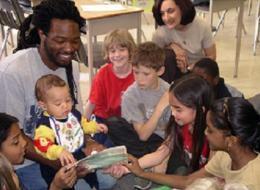
We are building our world on a social fault line where we have failed to realize the greatest minds alone will not solve social problems. We also need great hearts at the table. "The Empathic Civilization" shines light on evidence from neuroscience that shows human nature is empathic. The basis for solving all of the problems we face is empathy. If homo empathicus can get that right, we allow for the viability of our physical and social universe.
And yet our ecosystems are withering on the vine without empathic input from a globalized, interconnected, citizenry. We may be on the verge of the Age of Empathy, but we still have a long journey ahead. In fact, I would argue that we are in still in our infancy, and that we live in an emotionally illiterate North America.
It is not hard to find examples of this. Huge sectors of humanity are marginalized by virtue of their difference. People living with mental illness or addictions are blamed and shamed instead of receiving our support. We have failed in responding empathically to the plight of indigenous peoples of the world. Genocides and wars take place -- and most of us barely notice. Many of us are fine with the existence of poverty, both in other countries and our own. We pay lip service to caring, but our behaviors are unchanged. This is not empathy.
Empathy is correctly thought of as the ability to put yourself in someone else's shoes to feel what they feel. There is both a cognitive and an emotional aspect to empathy. We need the cognitive side to take the perspective of another, and emotional knowledge to understand how that person would feel given their perspective. Once you feel empathy for someone else, it changes you, and often it changes your behavior. Empathy is the basis for all prosocial behavior -- traits such as sharing, caring, cooperating, standing up to injustice, and being inclusive.
However, empathy is not just a matter of nature, but also of nurture. Homo empathicus may be born with the capacity for empathy, but we must experience it to know how to do it. Empathy develops out of our earliest loving relationships.
And here is where we have a tremendous opportunity as a society. If we want to change societal levels of empathy, the best place to start is with children. We can impact civilization in profound and monumental ways by supporting the development of empathy in all children. Just imagine: an entire generation of children, with their capacity for empathy fully nurtured, growing up to become the parents, citizens, and world leaders of tomorrow. The well-known African proverb is that it takes a village to raise a child. What I'm proposing is that it might take an empathic child to raise a village (and many children to raise our global village).
My life's work has been dedicated to this idea. Roots of Empathy, a program I founded in Canada in 1996, aims to create caring, peaceful, and civil societies -- child by child -- through the development of empathy in children. Our program involves monthly visits by an infant and parent to a classroom during the first year of a baby's life. The parent-infant relationship is the best example of emotional attunement there is, which is why I chose it as a model of empathy for children to experience.
 In Roots of Empathy, children become scientists who explore the inner consciousness of a baby through a curriculum led by a certified instructor, who guides them to describe what the baby is feeling and how the parent is paying attention to the baby's needs. This powerful learning is then extended outwards so children identify and reflect on their own thoughts and feelings and those of others (empathy). For many children, this is the only time where we actually attend to their emotional needs as well as their academic development.
In Roots of Empathy, children become scientists who explore the inner consciousness of a baby through a curriculum led by a certified instructor, who guides them to describe what the baby is feeling and how the parent is paying attention to the baby's needs. This powerful learning is then extended outwards so children identify and reflect on their own thoughts and feelings and those of others (empathy). For many children, this is the only time where we actually attend to their emotional needs as well as their academic development.
Ten years of study by independent researchers in multiple countries has shown that children experiencing Roots of Empathy have dramatically reduced levels of aggression and increased levels of social and emotional literacy. The program reduces bullying, creates a positive foundation for mental health, teaches children about responsible and responsive parenting, and creates an environment where vulnerable kids become more resilient and aggressive or dominant children become more inclusive. The benefits last years and have a positive effect on academic outcomes. Giving children Roots of Empathy is like providing societal rocket fuel so that empathy can thrive.
One of the greatest measures of a civilization is how it treats its children. Do we see them just as future breadwinners who will support us in our old age? Or do we see them as people who will lead us to a higher moral level of civilization?